By John Helmer, Moscow
Still coughing from the effects of the influenza which has infected most of Europe this winter, President Vladimir Putin has declared that for his last term in office, Russia is at war with the United States.
In his Federal Assembly speech on March 1, Putin also made sure that for his succession, he intends the Russian military-industrial complex to prevail over the oligarchs on whom Kremlin rule has depended since 1996. Politically, this means the rise of Dmitry Rogozin, currently deputy prime minister in charge of the defence sector, and Sergei Shoigu, the defence minister. Putin has signalled he intends the defeat of the pro-American business faction in Moscow, which US sanctions have been attempting to promote since 2014.
For the first time in the 25-year history of the Assembly address, Putin added 40 minutes, an extra third, to his standard one-hour delivery. The additional time he spent describing Russian military technology as the leading force for innovation and growth in the country. For seventy minutes Putin repeated domestic policy clichés and election-campaign promises, gesturing from stiff shoulders with his left hand. For the last third of his speech, Putin relaxed his shoulders, thrusting with his right hand and raising his right index finger.
The full text of the speech (in English) can be read here. For the coughing, body language and the audience response, watch the video.
From multiple camera positions the Kremlin propaganda unit displayed the political elite of the country; Vladimir Zhirinovsky, the only presidential runner present apart from Putin; and many smiling young women. Patriarch Kirill of the Russian Church was seated in the first row, beside and to the right of Valentina Matvienko, Speaker of the Federation Council, and Prime Minister Dmitry Medvedev. The representatives of the Moslem and Jewish religions were seated behind.
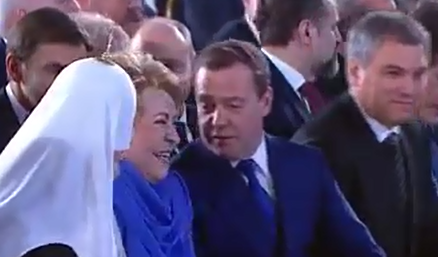
Left to right: Kirill; Matvienko; Medvedev; and Vyacheslav Volodin, Speaker of the State Duma.

Left to right in the second row: Metropolitan Varsonofy of St. Petersburg, the administrator of the Church; Metropolitan Vladimir of Moldova; in green turban the grand mufti Talgat Tajuddin; in white turban Ravil Gainutdin, chief mufti of the Central Spiritual Board of Muslims; and Berel Lazar, chief rabbi. In front of them, at centre, Vladimir Surkov, Kremlin assistant for negotiations on the Ukraine front.
The Federal Assembly address by the president is a constitutional requirement. It ought to be given each year. In fact, in 2017 none was given. That’s because Putin gave the 2016 speech at the end of the year – on December 1, 2016. Article 84 of the Constitution enacted by Boris Yeltsin in December 1993 says: “The President of the Russian Federation shall address the Federal Assembly with annual messages on the situation in the country, on the guidelines of the internal and foreign policy of the State”. The date of the presidential address is not fixed in law; neither is the composition of the audience.
The 2015 address was also given in December of that year: Putin spoke for a fraction less than 60 minutes. He devoted a few seconds to war: “The Russian Army and Navy,” he said, “have convincingly demonstrated their combat readiness and their increased capabilities. Modern Russian weapons have proved to be effective, and the invaluable practice of using them in combat conditions is being analysed and will be used to further improve our weapons and military equipment. We are grateful to our engineers, workers and all other personnel of our defence companies.”
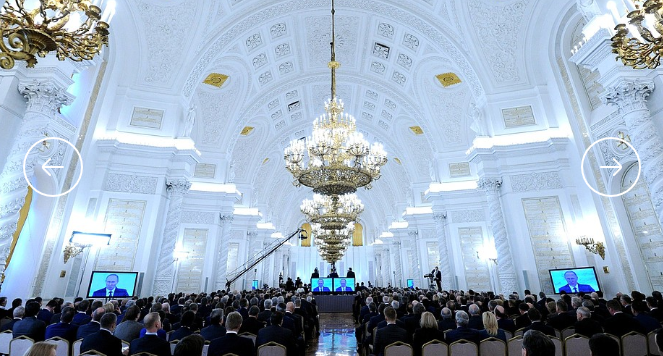
Putin addresses the Federal Assembly on December 3, 2015. The front-row seating protocol placed Sergei Ivanov, then chief of the Kremlin staff, on the right of the prime minister, in the seat which Patriarch Kirill was to take last week. In 2015 Kirill was relegated to the prime minister’s left. Source: http://en.kremlin.ru/events/president/news/50864
By name in 2015, the enemy of Russia, according to Putin, was terrorism and “a certain part of the current ruling establishment of Turkey.” “We know who are stuffing pockets in Turkey and letting terrorists prosper from the sale of oil they stole in Syria. The terrorists are using these receipts to recruit mercenaries, buy weapons and plan inhuman terrorist attacks against Russian citizens and against people in France, Lebanon, Mali and other states. We remember that the militants who operated in the North Caucasus in the 1990s and 2000s found refuge and received moral and material assistance in Turkey. We still find them there.”
Putin attacked Turkey’s President Recep Tayyip Erdogan. “The Turkish people are kind, hardworking and talented. We have many good and reliable friends in Turkey. Allow me to emphasise that they should know that we do not equate them with the certain part of the current ruling establishment that is directly responsible for the deaths of our servicemen in Syria.”

Putin meeting Erdogan at the Kremlin on September 25, 2015. Two months later, on November 24, the Turkish Air Force shot down a Russian Su-25 over Syria, resulting in the death of one of the Russian pilots, and the imposition of Russian economic sanctions against Turkey on November 28.
A year later, in Putin’s Assembly address on December 1, 2016, he spoke for roughly the same hour. The military industrial complex was mentioned in passing; war not at all. “We have carried out far-reaching modernisation at our defence industry enterprises,” Putin said, following Rogozin’s script but cutting it to a fraction. “This has resulted in increased production and, particularly important, in a significant increase in labour productivity. The defence industry has posted very good results and gives a good example. In 2016, we expect growth in the defence industry to reach 10.1 percent, and a labour productivity increase of 9.8 percent.”
This was beating swords into ploughshares, Putin tried to reassure. “We must direct the defence industry to produce up-to-date competitive civilian products for healthcare, energy, aviation and shipbuilding, space exploration and other high-tech industries. The share of civilian products must increase to at least one-third of the defence industry’s total output within the next 10 years.”
The US was still Putin’s hope: “I certainly count on joining efforts with the United States in the fight against real rather than fictional threats, international terrorism being one of them. That is the task our servicemen are fulfilling in Syria. Terrorists have suffered significant losses. The Russian Army and Navy have shown convincingly that they are capable of operating effectively away from their permanent deployment sites.”
Last week’s address was double all previous lengths, with an unprecedented reason. Putin has never before spent so much of his speech on warfare — and on the US as Russia’s arch enemy.
Putin began with a domestic policy agenda which isn’t new, and isn’t likely. “What should be our priority? Let me reiterate that I believe that the main, key development factor is the well-being of the people and the prosperity of Russian families.” He proposed a GDP growth rate of 7% per annum; a health care budget equal to 4% of GDP; an increase of life expectancy to more than 80 years by 2030; higher incomes, lower mortgage interest rates, more affordable housing.
There were also promises to the oligarchs. The sanctioned Rotenberg brothers were promised the doubling of spending on regional and local road-building to Rb11 trillion (about $200 billion) over the next six years. German Gref and other oligarchs investing in private schools were promised a federally financed “shift to completely new education methods, including personalised learning, in order to cultivate in our children a readiness for change and creative curiosity, and teach them to work in teams, which is very important in the modern world, and other life skills applicable to the digital era.”
Anatoly Chubais was promised an extension of his job at Rusnano with “our duty to support high-technology companies, offer start-ups a favourable environment and introduce new industrial solutions.” Igor Zyuzin, owner of the Mechel steel, coal and coke group and principal polluter of Chelyabinsk city, was let off with delay until 2021 to “convert to the best available environmentally friendly technology.” Oleg Deripaska, polluter of Lake Baikal, was let go with a passing and indefinite promise to “launch conservation projects for the unique natural systems of Lake Baikal and Lake Teletskoye.” Alexei Kudrin, former finance minister and candidate prime minister opposed to welfare and defence spending, was reduced to Putin’s 5-word pledge to “guarantee entrepreneurial freedom and competition.”
The corrupt collapse of Russia’s major commercial banks, and their equally corrupt Central Bank bailout by Governor Elvira Nabiullina, was reported by Putin this way: “the state has taken over a number of financial assets in an effort to revive the banking sector. These initiatives are headed in the right direction and have my support. That said, these assets should be put on the market and sold without delay.”
How to pay for all of this Putin dismissed in a line: “The future Government will have to establish new taxation rules as soon as possible. They should be stable and fixed for the next few years.” As for corruption, Putin’s emphasis was on catching those accepting bribes, relieving thereby those paying them. “We need to get rid of everything that enables corrupt officials and law enforcement officers to pressure businesses.”
Putin’s domestic policy presentation reflected his conviction that he can stay one step ahead of the revolution of rising expectations by promising the opportunity for small businessmen to start businesses with easier interest rates, lighter regulation, and fewer asset raids. He did not mention the word “equality”, nor the word “wealth”, nor the word “oligarch”. He avoided reminding the national audience of what all Russians acknowledge.
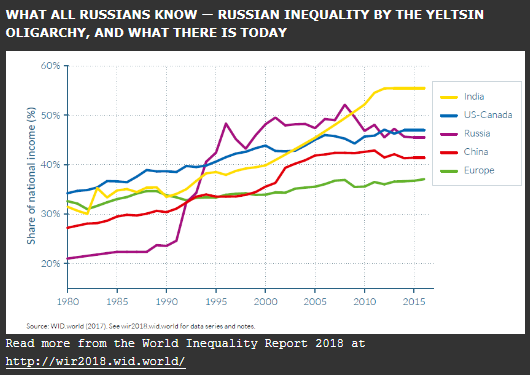
For Putin’s contribution to the growth of Russian inequality, read this.
Putin also refused to address the prevailing opinion among Russian voters of what interests he and his government stand for, and who benefits most from his policies.
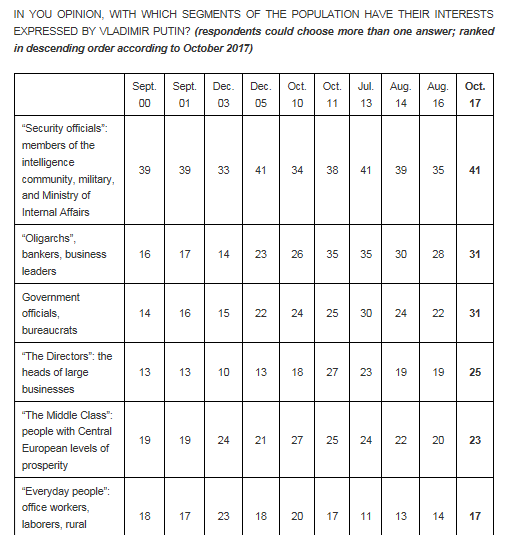
Source: https://www.levada.ru/en/2017/12/11/vladimir-putin-s-work/ Click for the full story.
At Minute 1:15:26, Putin became a changed man. “I will speak about the newest systems of Russian strategic weapons that we are creating in response to the unilateral withdrawal of the United States of America from the Anti-Ballistic Missile Treaty and the practical deployment of their missile defence systems both in the US and beyond their national borders.”
A decade ago, Putin said, “nobody really wanted to talk to us about the core of the problem, and nobody wanted to listen to us. So listen now.” This produced the only standing ovation of the address.
This was followed by Putin’s only attempts in two hours to joke, as he told the television audience some of the newly developed weapons haven’t been named yet. He invited them to send in their ideas to the Defence Ministry. The audience camera crews focused on the military leadership:
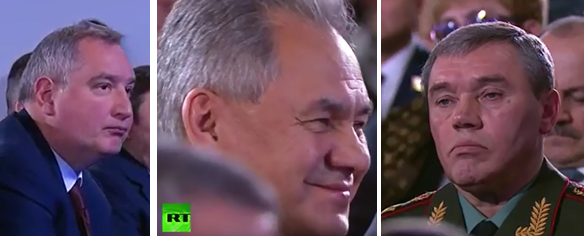
Left to right: Rogozin, Shoigu, and General Valery Gerasimov, Chief of the General Staff.
Putin’s analysis of the new weapons, and their targeting on US territory, is succinct. For further analysis, read Alexander Mercouris’s report. The usually careful Bulletin of the [American] Atomic Scientists claimed Putin “provided no proof that the new nuclear platforms actually exist” and attempted to dismiss the “video animations of the alleged weapons”. Putin anticipated the reaction. “Be sure that everything I have said today is not a bluff ‒ and it is not a bluff, believe me.”
Rogozin, Shoigu and Gerasimov wrote the text; for the first time Putin said it with enthusiasm, and without qualifying himself. “To those who in the past 15 years have tried to accelerate an arms race and seek unilateral advantage against Russia, have introduced restrictions and sanctions that are illegal from the standpoint of international law aiming to restrain our nation’s development, including in the military area, I will say this: everything you have tried to prevent through such a policy has already happened. No one has managed to restrain Russia.”
As a statement of Russian strategy, Putin is turning the US theory of Russian regime change on its head, reinforcing the president instead of isolating and toppling him. In practice, Russian sources in a position to know believe his performance reveals the new power of the military-industrial complex and the General Staff to fight the business oligarchs for influence over Putin, and for winning the succession. They predict Putin’s successor will be more military-minded, more anti-American than Putin thought safe for himself until now.


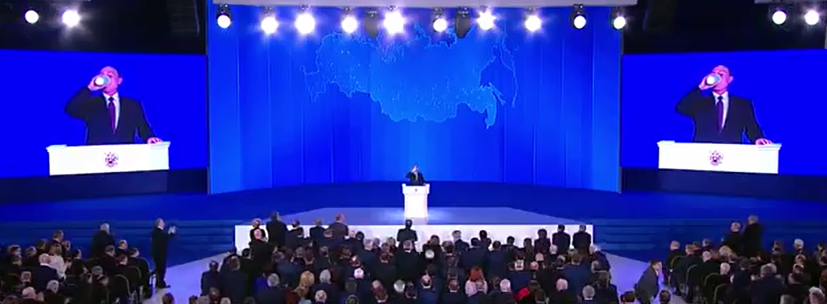










Leave a Reply